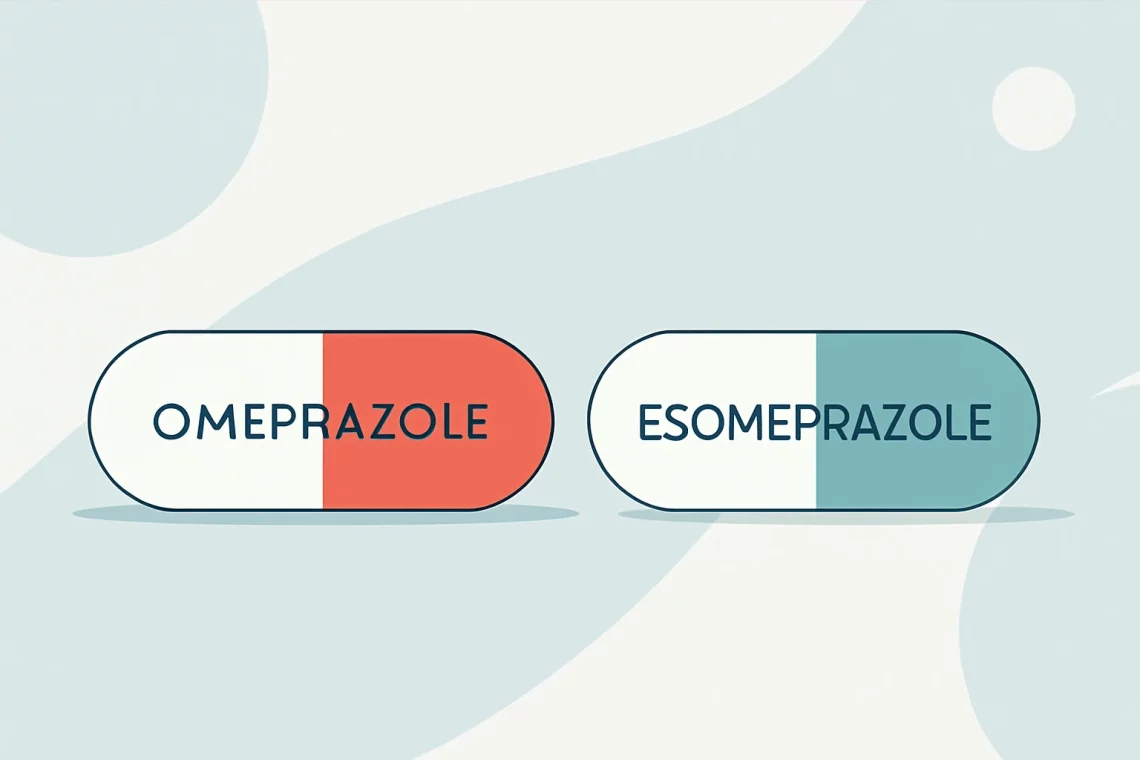
Omeprazole vs Esomeprazole: Which Is Right for Your Treatment?
Omeprazole and esomeprazole are two widely used medications that belong to a class of drugs known as proton pump inhibitors (PPIs). These medications play a crucial role in managing conditions related to excessive stomach acid production, such as gastroesophageal reflux disease (GERD), peptic ulcers, and Zollinger-Ellison syndrome. While both drugs serve a similar purpose, they differ in their chemical structure, effectiveness, and side effects, leading many patients and healthcare providers to weigh the benefits of one over the other. Understanding the nuances between omeprazole and esomeprazole is essential for making informed decisions about treatment options. As patients seek relief from their symptoms, it’s important to consider factors such as dosage, potential interactions with other medications, and individual responses to treatment. In this article, we will explore the differences and similarities between these two medications, helping you gain a clearer understanding of which option might be best suited for your needs.
Understanding Omeprazole
Omeprazole is one of the first proton pump inhibitors developed for the treatment of acid-related disorders. It works by blocking the proton pump in the stomach lining, which is responsible for the secretion of gastric acid. By inhibiting this pump, omeprazole effectively reduces the production of stomach acid, providing relief from symptoms associated with conditions like GERD and peptic ulcers.
One of the key features of omeprazole is its effectiveness in promoting healing of the esophagus in patients with erosive esophagitis, a condition often caused by acid reflux. Studies have demonstrated that omeprazole can significantly improve symptoms and promote mucosal healing. In addition to its primary uses, omeprazole is also sometimes prescribed for other conditions, such as dyspepsia and to prevent stomach ulcers in patients taking non-steroidal anti-inflammatory drugs (NSAIDs).
Omeprazole is typically available in oral form, including both capsules and tablets. The standard dosage for adults usually ranges from 20 mg to 40 mg, depending on the severity of the condition being treated. It’s important for patients to follow their healthcare provider’s instructions regarding dosage and duration of treatment, as prolonged use of PPIs can lead to potential side effects.
Common side effects of omeprazole may include headaches, nausea, vomiting, diarrhea, and abdominal pain. While these side effects are generally mild, patients should be aware of the possibility of more serious risks, including kidney problems and vitamin B12 deficiency with long-term use. It’s crucial to have regular check-ups with a healthcare provider to monitor any potential complications.
Exploring Esomeprazole
Esomeprazole is a newer proton pump inhibitor, developed as an enantiomer of omeprazole. This means that it is a specific molecular form of omeprazole, which can result in different pharmacokinetic properties. Esomeprazole is often marketed under the brand name Nexium and is known for its increased bioavailability compared to omeprazole.
One of the primary advantages of esomeprazole is its effectiveness in providing more consistent acid control throughout the day. Some studies suggest that esomeprazole may be more effective than omeprazole in certain patient populations, particularly those with severe reflux disease. Additionally, esomeprazole may offer faster symptom relief for some individuals, making it a popular choice among healthcare providers.
Like omeprazole, esomeprazole is indicated for the treatment of GERD, erosive esophagitis, and Zollinger-Ellison syndrome. It is typically prescribed in doses ranging from 20 mg to 40 mg, similar to its counterpart. However, esomeprazole is also available in a delayed-release formulation, which can enhance patient adherence to the treatment regimen.
Patients taking esomeprazole may experience side effects similar to those associated with omeprazole, including headaches, gastrointestinal disturbances, and abdominal discomfort. As with any medication, it is essential for patients to discuss any concerns with their healthcare provider, particularly when it comes to long-term use and potential risks.
Comparing Efficacy and Side Effects
When comparing omeprazole and esomeprazole, one of the most significant factors to consider is their efficacy in treating acid-related disorders. Research indicates that while both medications are effective, there may be differences in how patients respond to each drug. Some patients may find that one medication provides better symptom relief than the other.
The effectiveness of these medications can also be influenced by individual factors such as age, metabolism, and the severity of the condition being treated. For example, patients with more severe GERD may benefit from esomeprazole’s ability to provide more consistent acid suppression, while those with milder symptoms may find omeprazole to be sufficient.
Another important aspect to consider is the side effect profile of each medication. Both omeprazole and esomeprazole share similar side effects, including gastrointestinal issues and headaches. However, some studies have suggested that esomeprazole may have a lower risk of certain side effects, such as gastrointestinal infections, due to its more targeted action.
Additionally, the long-term use of both medications raises concerns regarding potential risks, including kidney disease, bone fractures, and vitamin deficiencies. Patients should ensure that they are informed about these risks and engage in discussions with their healthcare providers about the duration of treatment and the necessity of ongoing monitoring.
Choosing the Right Medication for You
Choosing between omeprazole and esomeprazole ultimately depends on individual circumstances and preferences. Factors such as overall health, the specific condition being treated, and previous responses to medication can influence the decision-making process.
For those who have previously used omeprazole and found it effective, there may be no immediate need to switch to esomeprazole. However, if a patient experiences inadequate symptom control or side effects with omeprazole, discussing the possibility of switching to esomeprazole with a healthcare provider could be beneficial.
Additionally, cost and availability may also play a role in the decision. Omeprazole is often available as a generic medication, making it a more affordable option for many patients. Esomeprazole, being a newer drug, may be more expensive and not covered by all insurance plans. Therefore, patients should consider discussing their financial situation with their healthcare provider to find the most appropriate and cost-effective treatment.
Ultimately, the choice between omeprazole and esomeprazole should be guided by a thorough discussion with a healthcare provider, taking into account all relevant factors, including symptoms, side effects, and personal preferences.
**Disclaimer:** This article is for informational purposes only and does not constitute medical advice. Always consult a healthcare professional for medical concerns or treatment options.




